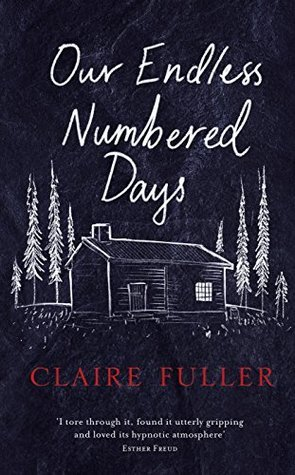Our Endless Numbered Days by Claire Fuller
Her survivalist father, who has been stockpiling provisions for the end which is surely coming soon, takes her from London to a cabin in a remote European forest. There he tells Peggy the rest of the world has disappeared. And so her life is reduced to a piano which makes music but no sound, a forest where all that grows is a means of survival. And a tiny wooden hut that is Everything.
Peggy is not seen again for another nine years.
1985: Peggy has returned to the family home. But what happened to her in the forest? And why has she come back now?
Review: In 1976, 8-year-old Peggy Hillcoat has a relatively charmed life in London with her pianist mother Ote and survivalist hobbyist father James. That all changes when her father, who has been stockpiling supplies for the end of the world, tells her that they are going on a holiday, just the two of them. He takes her deep into a remote European forest to a rundown tiny cabin. Then, he tells her that the rest of the world has disappeared and everyone they knew has died. Peggy's life is reduced to the tiny cabin, her father's company, a piano that makes no sound, and a forest that is their only means of survival. Peggy does not see another human being for nine long years.
In 1985, Peggy has finally returned home. She is gaunt with ruined teeth. It feels strange to be home with her mother and her little brother who was born after she disappeared. The life she thought had been destroyed has gone on without her all this time. She is unable to fully comprehend what has happened to her or to help fill in the gaps for her mother and the police. What happened to her in the forest? Why has she returned now?
There is something so devastating about the scenes with Peggy as a young girl, clutching her beloved doll Phyllis, as her father drags her out into the middle of nowhere. She nearly dies multiple times, and it was hard to read about the pair nearly starving to death that first winter. They resort to boiling pine needles and her father's leather belt. Their isolation is complete and their circumstances dire. Peggy blindly trusts her father and what she is told, just like most young children take their parent's words for what they are. Such an innocent child, a pawn in her father's unstable and dangerous plan to plunge her into the wilderness permanently.
There is a profound sense of unreality about everything in Peggy and her father's life in the wilderness. He stops calling her Peggy almost immediately and refers to her only as Punzel or later by her mother's name. It's clear that over time, her father begins to conflate Peggy with the wife he left behind. Because Peggy is just a child, there is little insight into her father's thought process, but in many ways it seems like he was playing out an elaborate scenario, with poor Peggy caught in the crosshairs of his plans.
It was also clear that there were gaps in Peggy's narration. For instance, she references fighting to begin sleeping in her own bed and her father complaining. What is she not saying? If her father would drag her away from her life and nearly kill her in the wild, what else would he do? Without giving away spoilers, Peggy's own mental health is clearly faltering in the final months in their time in the wild. To escape, her mind gave her an opportunity to transfer responsibility. Just like her father passionately believes in an alternate reality where the world has disappeared and they must hunt to survive in the wild, so too does Peggy begin to genuinely believe in her own altered reality.
This is the third novel I have read by Claire Fuller. I love her writing style that is just truly lovely, with beautiful and original turns of phrase, such as Peggy describing her budding sexuality by saying, "And between my legs, I had the sensation of the seconds before a thunderstorm begins." Her novels are full of uncomfortable realities, of individuals whose stories have gone off the rails in distorted ways and who fall outside of secure, polite society. Her writing is also characterized by visceral physicality. This book, which was her first, is no different. The reader is taken through the paces with Peggy and feels the gnawing hunger in her belly, the bitter taste of tea made from pine needles, the stench of animal hides poorly preserved and rotting, the raw flesh of Peggy's ankles that are rubbed raw by her makeshift boots, and the ragged scraps of ruined clothes that she tries to fashion into clothing as she grows.
Peggy comes of age in the forest and the depth of everything she loses in the almost decade she is sequestered away is only begun to be comprehended in the alternating chapters where she is reunited with her mother. This is a dark novel and truly horrifying in many ways. Peggy and her family are forever altered and while Peggy seems incapable of truly feeling the weight of what it means for her future, as a reader I walked away from the novel's conclusion wondering where she could possibly go from here.
Stars: 4
Related Titles:



Comments
Post a Comment